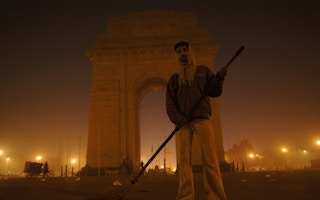Finding a decent job was 23-year-old Shikher’s only goal when he left his village in northern India for the capital two years ago, but things did not go exactly as planned.
At first, he worked in a factory making cellphone chargers for just 8,000 rupees (US$96) a month. Exhausted by the 12-hour shifts, he turned to gig work as a delivery rider for an online grocery platform - still his job today.
As Indians vote in an election that has spotlighted younger voters’ unemployment concerns, Shikher said he was pessimistic about his prospects - whatever the election outcome.
“(The) future of people like me is doomed, we will continue to work in these odd jobs and see where life goes,” he told Context as he sipped a cup of tea while waiting outside an apartment building for his next order.
Shikher is among more than 18 million people voting for the first time is India’s six-week-long general election, which started on April 19.
Like many young voters, he says the next government must tackle youth unemployment and a dearth of good quality jobs.
Despite world-beating growth, India’s economy has scrambled to generate enough work for its people. Its youth make up most of the nation’s unemployed workforce, according to a report by the Institute for Human Development (IHD) and International Labour Organization (ILO).
While polls project Prime Minister Narendra Modi’s Bharatiya Janata Party (BJP) will win a third term, lack of jobs is one of the biggest concerns emerging from Modi’s decade-long rule, according to a recent survey of 10,000 people across the country by pollsters CSDS-Lokniti.
Nearly 30 per cent of respondents named unemployment as the biggest election issue, followed by concern over inflation and rising tensions between religious groups.
Nearly two-thirds of those polled said they would vote for the Hindu nationalist BJP given the government’s strong record of economic growth, amid a sense of pride over construction of a massive Hindu temple.
Pay and conditions ‘deteriorate’
While India’s overall unemployment rate has come down to a little under 7 per cent, showing that things are starting to get better from highs above 8 per cent in recent years, the ILO-IHD study said the improvement was “paradoxical”.
The March 2024 study said working conditions, wages and job security were getting worse.
In the formal economy, the report showed there has been a rise in casual work such as temporary contracts - which generally leads to lower average daily wages and reduced social security benefits.
Joblessness is also much more of a problem among young Indians, who make up a sizeable chunk of the country’s 1.4 billion population. In 2021, people aged 15-29 accounted for 27.2 per cent of the total population, official data shows.
Unemployed youths accounted for 83 per cent of the total number of unemployed people in 2022. The share of educated youths in the total rose to nearly 66 per cent from 54 per cent in 2000, the ILO-IHD study found.
Despite graduating with a first-class science degree, Ayush Shukla said his job-hunting experiences had been grim.
“All I could find was manual labour work paying me 200-300 rupees a day,” said Shukla, 23, who eventually found his first job in the insurance sector through family connections.
Nearly three-fifth of respondents in the CSDS-Lokniti survey said getting jobs had become more difficult in the last few years.
Shukla counts himself as one of the lucky ones: Many of his fellow graduates, peers from vocational training centres and friends with technology degrees are still working as manual labourers, he said.
“This government has not done anything to help young people get jobs,” said Shukla, who used to support the BJP but said he was angry over the youths job issue. He did not say which party he planned to vote for in the election.
Policy pledges on jobs
With India likely to add 7 million-8 million youths annually to the labour force in the next decade, economic policies to boost productive non-farm employment are needed - especially in manufacturing, the ILO-IHD study said.
The BJP has pledged in its election manifesto to continue programmes that incentivise industries and small businesses to create jobs. It also promises to review minimum wages and extend social security benefits to informal workers including those in the 7.7-million strong gig economy.
The main opposition Congress party, meanwhile, promises to raise minimum wages, as well as pledging workplace apprenticeships for the under 25s with a 100,000-rupee annual stipend and to waive student loans.
It says it would also boost labour rights for gig workers, whose ranks are expected to swell to 20 million within six years, according to the government’s top policy think-tank.
At work on the streets of Delhi, Shikher said he hoped the next government would ramp up worker protections in the sector - from prohibiting involuntary targets that hit riders’ pay to guaranteeing cover against illness or accidents.
But despite the parties’ manifesto promises, he said he did not expect the election to improve his working conditions.
“I don’t know which party to vote for, all are the same,” he said.This story was published with permission from Thomson Reuters Foundation, the charitable arm of Thomson Reuters, that covers humanitarian news, climate change, resilience, women’s rights, trafficking and property rights. Visit https://www.context.news/.










